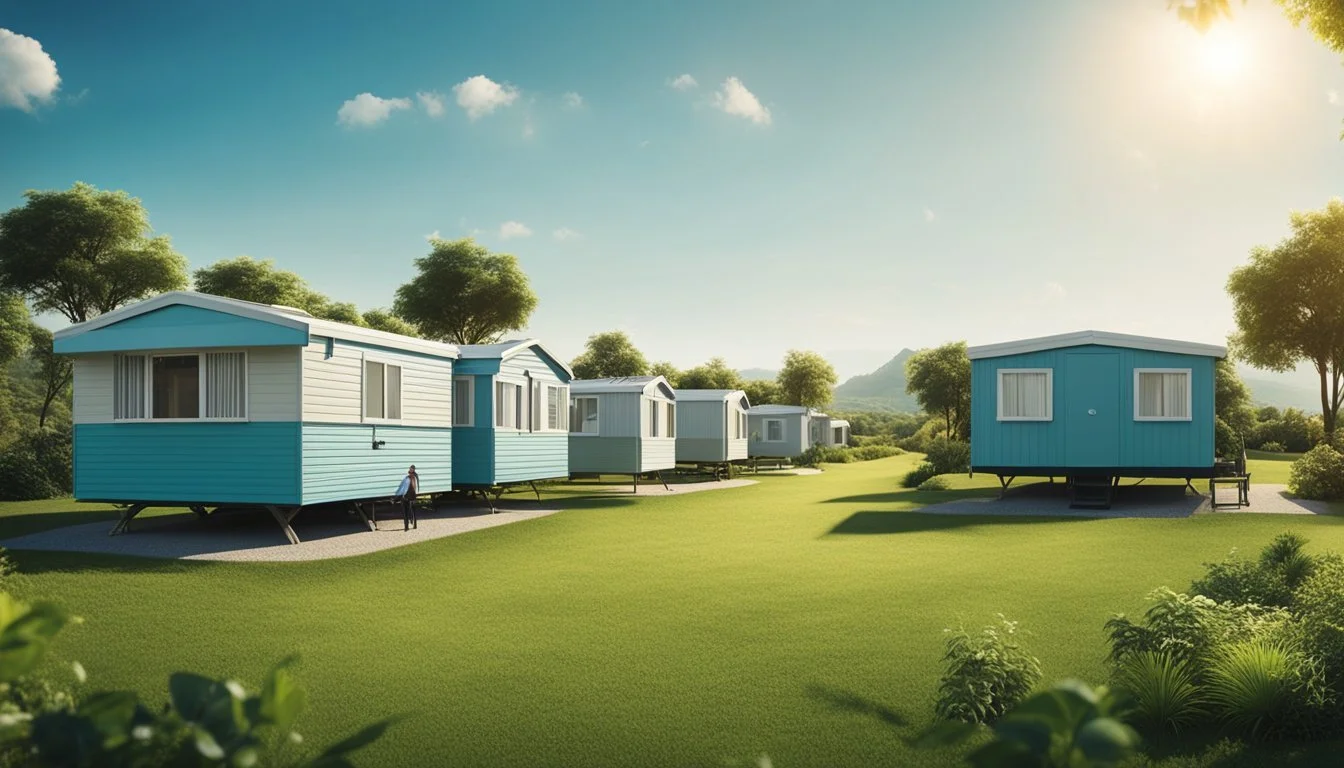The Role of Mobile Homes in Environmental Literature
Insights into Eco-criticism
Mobile homes, often perceived as mere shelter solutions, play a significant role in environmental literature and ecocriticism. They symbolize a unique intersection between human habitation and ecological impact, providing a vantage point for exploring themes of impermanence and mobility in a rapidly changing world. As a form of affordable housing, mobile homes are closely tied to discussions of environmental justice, highlighting the socio-economic dimensions of living sustainably within limited means.
Ecocriticism, by focusing on the portrayal of nature and human interactions in texts, provides a framework to analyze how mobile homes relate to broader environmental concerns. Literature often uses these spaces to reflect on humanity's relationship with the Earth, echoing the adaptability and resilience required in facing ecological challenges. These narratives help readers understand the socio-environmental implications of transient living and its potential to foster a deeper connection with natural surroundings.
Environmental literature sometimes portrays mobile homes as embodiments of minimalist living that challenge conventional housing norms. This perspective emphasizes the reduced ecological footprint associated with such lifestyles, prompting readers to reconsider traditional views on home and community. Through this lens, mobile homes become a vital part of discussions in ecocriticism, urging a reevaluation of how society perceives and interacts with the environment.
The Emergence of Ecocriticism
Ecocriticism bridges literature and ecology, emphasizing the promotion of ecological awareness through text analysis. It captures how literature reflects and constructs environmental issues by providing critical insights.
Historical Development
The roots of ecocriticism trace back to the early 1970s with Joseph Meeker's concept of "literary ecology." This idea found its formal shape with seminal works like "The Ecocriticism Reader" in the mid-1990s, which marked a pivotal moment in organizing and defining the field. During this period, academic interest flourished, giving rise to influential groups such as the Association for the Study of Literature and Environment (ASLE).
These developments were spurred by growing ecological concerns and a need for interdisciplinary collaboration. As ecocriticism gained momentum, it positioned itself at the intersection of literary studies and environmental thought, fostering a critical dialogue between the two.
Defining Ecocriticism
Ecocriticism examines the representation of nature in literary and cultural contexts. It involves an interdisciplinary approach, where various scientific perspectives intertwine with literary analysis to address contemporary ecological challenges.
Through this lens, scholars explore the dynamic relationship between humans and the environment within texts, offering insights into how literature shapes, reflects, and sometimes challenges ecological perceptions. By focusing on themes such as environmental justice, sustainability, and cultural narratives of nature, ecocriticism provides a platform for assessing the cultural constructs that affect ecological awareness and activism.
Ecocriticism and Environmental Literature
Ecocriticism offers a lens to view the intricate relationship between nature and literature. This approach evaluates how textual representations engage with environmental issues, combining insights from literary studies and ecological awareness.
Representation of Nature in Literature
The depiction of nature in literature serves as a crucial focal point for ecocriticism. Authors often portray natural landscapes not merely as settings but as integral components of the narrative that interact vigorously with characters and plot. Such representations can vary from idyllic and harmonious to hazardous and foreboding. These portrayals reflect societal attitudes toward nature and its perceived value. Nature writing has emerged as a distinguished genre within literature, aiming to inspire environmental awareness through vivid descriptions and personal reflections on the natural world.
Beyond aesthetics, these texts prompt readers to reevaluate humanity's place within the ecological system. They challenge readers to consider the consequences of human activity on the environment. Through this dual approach, literature invites contemplation of both the beauty and vulnerability of nature, making environmental narratives a compelling realm for literary exploration.
Literary Works and Environmental Discourse
Environmental literature often stands at the forefront of discussing pressing ecological issues. Through storytelling, authors disseminate the environmental imagination—a concept that blends creative expression with ecological consciousness. Iconic literary works have fueled environmental discourse, prompting societal introspection and action. These narratives examine themes like pollution, climate change, and conservation, fostering an informed public dialogue.
By integrating environmental challenges into their plots and themes, authors enhance understanding of ecological struggles. This synergy between literature and environmentalism amplifies the voice of ecocriticism, urging readers to engage with sustainability and ecological resilience actively. Consequently, literary studies enrich the cultural critique of ecological concerns, elevating environmental literature as an influential medium within ecocritical conversations.
Mobile Homes in Ecocritical Perspective
Ecocriticism offers unique insights into the intersection of mobile homes with sustainability and literature. Mobile homes, often central to debates about eco-friendly living, present an ideal subject for exploring their impact on ecological narratives and environmental literature.
Sustainability and Mobile Living
Mobile homes contribute to sustainable living by minimizing the ecological footprint. These dwellings are often smaller and require fewer resources than traditional housing, aligning with the minimalist lifestyle associated with reducing consumption and waste. An interdisciplinary approach highlights how mobile homes promote eco-conscious designs, utilizing renewable energy sources like solar panels.
In times of ecological crisis, mobile homes provide flexibility and mobility. They serve as shelters in regions affected by natural disasters, offering immediate housing solutions. The diminished environmental impact of mobile homes becomes evident through their lower carbon emissions, encouraging a dialogue on sustainable housing alternatives.
Mobile Homes in Literary Analysis
Literary works often feature mobile homes as symbols of freedom and simplicity. By examining these narratives, ecocriticism reveals deeper connections between human mobility and environmental responsibility. Characters living in mobile homes typically embody a rejection of consumerism, reflecting broader themes of ecological awareness.
Mobile homes frequently act as backdrops in stories that critique modern industrial life. Authors use them to illustrate the potential for harmonious coexistence with nature. These settings allow for exploration of the characters' relationship with the environment, serving as a metaphor for adaptability and resilience in the face of environmental challenges. Interdisciplinary studies in literature underscore these narratives, enhancing the understanding of mobile homes within eco-critical contexts.
Intersections of Ecology and Society
Ecology and society intersect in powerful ways, particularly when exploring themes of environmental justice and the importance of an interdisciplinary approach. These aspects highlight how environmental literature can address issues such as inequality and the benefits of integrating diverse fields of study.
Environmental Racism and Justice
Environmental racism refers to the disproportionate impact of environmental hazards on marginalized communities. In literature, this theme underscores how ecological degradation often intersects with social injustices, emphasizing the need for equitable solutions.
Writers address such issues by illustrating the lived experiences of affected communities. These narratives highlight how industrial developments and waste are often located near low-income areas, leading to health concerns.
Environmental justice movements focus on advocating for policies that protect vulnerable populations from these impacts. Literature plays a significant role by raising awareness and pushing for systemic changes that address inequities in environmental policies. Understanding these dynamics in environmental literature helps readers grasp the broader societal implications of ecological issues.
The Role of Interdisciplinary Studies
An interdisciplinary approach is crucial in understanding the complex interactions between ecology and society. By integrating fields such as sociology, philosophy, and biology, environmental literature offers a richer, more nuanced view of ecological issues.
This method enables writers and scholars to explore ecological themes from various perspectives, enhancing the depth of analysis. For instance, combining scientific principles with cultural insights allows a multifaceted examination of how humans interact with nature.
Such studies foster innovative solutions to environmental problems by highlighting how interconnected systems operate. This approach also encourages collaboration between disciplines, leading to more comprehensive and effective strategies for addressing ecological challenges in society.
Theoretical Frameworks
Exploring the role of mobile homes in environmental literature requires a robust understanding of several theoretical frameworks. Ecofeminism emphasizes the interconnectedness of gender and ecological issues, while postcolonial ecocriticism highlights the intersections between colonization and ecological exploitation.
Ecofeminism and Mobile Homes
Ecofeminism considers the relationship between the oppression of nature and women. This perspective is vital in examining mobile homes as they often serve as residences for marginalized groups. The transient nature of mobile homes resonates with ecofeminism's critique of traditional housing's impact on the environment.
Mobile homes, often constructed with fewer resources, challenge the conventional housing norms that prioritize permanent structures. This aligns with deep ecology's advocacy for reduced ecological footprints. Ecofeminism in this context advocates for housing solutions that are both environmentally friendly and socially inclusive. It questions the gender dynamics in housing security, asking how mobile living can empower women within the larger ecological narrative.
Postcolonial Ecocriticism
Postcolonial ecocriticism examines how colonial legacies influence current ecological issues, especially in diverse communities. Mobile homes can represent postcolonial identities, offering a lens to view how mobility and displacement intersect with environmental concerns. This theoretical approach emphasizes the uneven distribution of ecological resources and opportunities.
Communities living in mobile homes often occupy areas prone to environmental degradation. Postcolonial ecocriticism seeks to highlight these injustices and provide a platform for those whose ecological realities are dictated by economic and political disparities. By focusing on mobile homes, this framework advocates for equitable access to sustainable living options, aiming to bridge the gap left by historical and ongoing colonization impacts.
Through these lenses, the study of mobile homes in environmental literature unveils deeper societal and ecological narratives, enriching the discourse on sustainable and equitable housing.
Environmental Crises and Narrative
Environmental literature plays a crucial role in highlighting the pressing issues of climate change and ecological disasters. Through narratives, it explores the impacts of environmental degradation on different communities, emphasizing themes such as mobility and housing, particularly in the context of mobile homes.
Climate Change and Ecological Disaster
Climate change narratives often revolve around the urgent crises affecting the earth and humanity. These stories are vital in illustrating the shifts caused by rising temperatures, ocean acidification, and species extinction. Literature about ecological disaster often portrays the struggles of individuals and communities dealing with these changes. Such narratives bring the gravity of environmental issues to the forefront, emphasizing the interconnectedness between human life and the environment.
Writers employ different narrative techniques to engage readers, using powerful imagery and storytelling to convey the immediate and long-term effects of climate change. These narratives often highlight the disproportionate impact on marginalized communities, bringing social justice into environmental discourse. By doing so, they encourage readers to consider the broader implications of their actions and the necessity for meaningful change.
Environmental Narratives in Context of Mobile Homes
Mobile homes offer a unique lens through which environmental narratives can be explored. These homes often symbolize transient lifestyles and are frequently situated in areas vulnerable to environmental threats. The portrayal of mobile home communities in literature underscores issues related to climate resilience and economic displacement.
Such narratives often depict how environmental degradation directly impacts those living in mobile homes, including threats from flooding, hurricanes, and other natural disasters. The representation of these challenges in literature prompts discussions on sustainability and mobile home design, advocating for policy changes and improved infrastructure. These stories are crucial for understanding the complex socio-economic and environmental dynamics at play in mobile home communities.
Cultural and Media Perspectives
Mobile homes have been featured significantly in various forms of media, often reflecting complex narratives about human-nature relationships. This exploration underscores the intersection of environmental literature, philosophy, and cultural criticism.
Representation in Film and Media
In film and media, mobile homes are frequently depicted within rural or natural settings, offering a unique perspective on ecological issues and human interaction with the environment. Movies often portray these spaces as symbols of a simpler lifestyle, closely linked to nature.
Filmmakers use mobile homes to highlight themes of transience and adaptability, aligning with philosophical ideas about mobility and environmental impact. Genre-specific representations can amplify these narratives, focusing on the connection or conflict between humans and natural landscapes.
Cultural Criticism and Environmentalism
Cultural criticism examines how mobile homes reflect broader societal attitudes towards the environment. Often seen as emblematic of economic hardship, mobile homes also symbolize a minimalist lifestyle, promoting environmental sustainability and resilience in eco-criticism.
Through literature and media, mobile homes are positioned as spaces of innovation and ecological conscientiousness, challenging traditional housing ideologies. This cultural lens provides insights into biological interactions and the philosophic implications of human habitats within the ecological system, critiquing and reshaping environmental narratives.
Advancing Ecological Consciousness
Ecological consciousness in literature and eco-criticism extends beyond thematic exploration to practical approaches that influence education and future methodologies. Emphasizing the interconnections between humans and nature can foster a widespread understanding of environmental issues.
Educational Implications
Educational institutions play a crucial role in nurturing ecological awareness. Introducing eco-literature in school curricula allows students to explore the relationship between humans and the environment. By studying works that highlight environmental themes, learners can develop an emotional and intellectual connection to ecological issues.
Higher education also contributes significantly in this area. Universities can focus on interdisciplinary courses that incorporate environmental science with literature. Workshops, seminars, and interactive projects deepen comprehension, encouraging students to propose creative solutions to environmental challenges. Incorporating community-based learning further enriches the educational experience, as it connects classroom discussions with real-world ecological concerns.
Future Directions for Ecocriticism
Ecocriticism is set to evolve with emerging environmental challenges. Scholars aim to broaden its scope to incorporate diverse global perspectives. By exploring non-Western viewpoints, eco-criticism can address ecological issues more inclusively.
Future methodologies might involve using digital platforms to analyze vast literary datasets. These tools can identify trends in the portrayal of nature and human interaction across different genres and historical periods. Additionally, collaborative research across disciplines can forge new frontiers in ecological literature studies. Conferences and publications can further disseminate advanced research, enabling continual growth and innovation in eco-criticism practices.
Conclusion
Mobile homes in environmental literature symbolize human mobility and interconnectedness with nature. These structures offer unique perspectives on human-nature relations, encouraging reflections on simplicity and sustainability.
Literary Theory: Writers utilize mobile homes to challenge traditional narratives and offer alternative views on environmental issues. The mobility of these dwellings provides a platform for exploring ecological footprints and sustainable living.
Incorporating postcolonialism into eco-criticism, mobile homes highlight marginalized communities' interactions with the environment. This connection underscores the ongoing dialogue between human habitation and ecological stewardship.
Through an examination of literary works, the role of mobile homes emerges as an essential element in understanding our relationship with the planet. Exploring these themes enriches eco-criticism and offers insights into potential pathways for sustainable futures.









